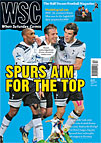 The media blame just about everyone for the failure of England’s 2018 World Cup bid
The media blame just about everyone for the failure of England’s 2018 World Cup bid
During the hung parliament of the 2010 general election the 24-hour news coverage made frequent and portentous reference to how the financial markets were reacting to events, instead of concentrating on political horse-trading and an unproportional voting system. In the run-up to the announcement of the 2018 World Cup hosts on December 2, Britain’s bookmakers were held in similar regard, despite having no actual bearing on the outcome of the decision. Although there was plenty of evidence to the contrary, England’s bid was installed as the favourite. So when Russia won, many in the press were shocked and extremely angry.
Following the media’s investigations into FIFA prior to the decision, Ian Wright predicted in his Sun column that England’s failure would be celebrated at Broadcast Centre: “The BBC have got exactly what they wanted… I wonder whether any of those involved can really look themselves in the mirror.” It was notable, however, that the Sun completely avoided any mention of the sting operation carried out by the Sunday Times – another News International paper. Once Wright had exhausted himself with the BBC, he fretted about freedoms in Qatar, before betraying a rather unfamiliar stereotype of the building trade: “Homosexuality is banned so no gay workers would be allowed to fly in and help build the grounds.”
Many supported the investigations, however. In the Mirror, Oliver Holt claimed that they hadn’t actually gone far enough and that “all the people who criticised the British media for exposing corruption within FIFA should shuffle away this morning and hang their heads in shame”. The Independent’s James Lawton was happy that England had salvaged “integrity and pride… an attempt to win, not subvert”.
Most headlines focused on a sense of outrage towards the politics, failed promises and alleged corruption of FIFA in general, and Sepp Blatter in particular. The Daily Mail mocked up The Oddfather, while, building on a common theme, the Mirror howled Mafifa. Terry Venables, writing in the Sun, described the selection process as “a complete and utter sham” before confusingly describing FIFA as “bleeding heart liberals… [who] opted for legacy over logistics”. A favourite refrain was “We never stood a chance” – many believed the decision had been made months ago. If so, the bookmakers must have been happy.
While it should have been clear to everyone that the 2018 bid was highly flawed, the revisionism began immediately. Many were keen to emphasise (and take solace in) the successful aspects – such as the bid presentation and the technical report – in order to keep to the official line. David Beckham claimed that, “The way we presented this bid was exceptional. It would have been one of the best if not the best World Cup in history”, while, according to the Sun, England’s campaign was “widely seen as superior in every aspect”. It would suit many in English football to believe that the bid was cheated rather than a failure.
Yet there was also criticism. The Daily Mail found a unique angle – England’s bid video was too multicultural. There was too much “Doing it for the greater good of the world” (possibly even the Third World) and too many “ethnically diverse figures” rather than “backdrops of Blighty” and “the smiling British Bobby”. Indeed, following December’s demonstrations the public image of the police force needs all the help it can get.
In the Independent James Corrigan believed that “England [has] every right to be annoyed but not necessarily with FIFA. That’s like taking your fury out on the dangerous dog and not the dolt who encouraged it… The bid prostituted itself from the very off, sucking up to the power brokers… That’s why you saw the leaders of the bidding team slating the press for revealing FIFA’s flaws. And for what? For FIFA to make England look laughing stocks again?”
The Daily Mail’s Jeff Powell was also embarrassed by the FA “blundering down the road of arrogance towards a gauche parade of celebrity and royalty, before which FIFA were expected to bend a craven knee. It was ego which betrayed the nation, long before exposé.”
Sensing an opportunity, Richard Scudamore, the Premier League chief executive, applied a soothing corporate balm to a nation’s wounds: “The fundamentals of English football don’t alter, do they? People will still be shouting on Saturday, people will still be playing. The game will continue on the trajectory it’s on in England.” Karren Brady, perhaps enjoying the top flight while she still can, took up Scudamore’s lead: “We have the Premier League for the world’s football fans to enjoy 40 weeks of every year. The World Cup happens once every four.”
On the contrary, though we’ll never know exactly why England’s 2018 bid failed, it’s likely that the Premier League, and the attitudes it has fostered, acted more as a hindrance than a help.
From WSC 288 February 2011